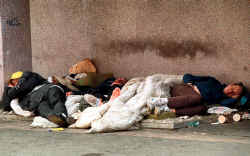Destitution high in Manchester among asylum seekers
Article published: Friday, June 18th 2010
The Boaz Trust, a charity providing accommodation to destitute asylum seekers, recently closed its night shelter for the summer. Last winter the shelter provided emergency accommodation to 64 people. According to Boaz and other refugee charities, there maybe thousands of asylum seekers could be destitute in Manchester.
 Under rules set by the previous government, asylum seekers are banned from paid employment and rely on a support system that provides an income roughly 30 per cent beneath the poverty line. Rejected asylum claimants typically have all support and accommodation cut 21 days after their appeal rights are exhausted.
Under rules set by the previous government, asylum seekers are banned from paid employment and rely on a support system that provides an income roughly 30 per cent beneath the poverty line. Rejected asylum claimants typically have all support and accommodation cut 21 days after their appeal rights are exhausted.
David Smith, director of the Trust, estimated that there could be up to 2,000 refused asylum seekers in the Manchester area. In addition, he told MULE that there are many asylum seekers with claims pending and who are therefore eligible for government support but have been destitute for months due to bureaucratic mistakes.
“There is a massive wait for people that are entitled to accommodation on the basis that they have a fresh claim or that they cannot be sent home,” said Smith.
“We currently have eight people waiting to hear, and seven of them have been waiting for 10 weeks or more. That’s seven people in our houses who should be accommodated by the government.”
Although one other shelter in Salford remains open during the summer, it is open to the general population and has extremely limited space.
Sofia, a woman from Zimbabwe, was unable to prove her nationality to the government and has been destitute for over a year. Trapped by fear of what would happen if she was forced to return she has to depend on charity to survive.
“I didn’t know what it was to be a beggar until I came here. I was always independent,” she said. “What can you do if you have no power as a human being? Our power has been taken away and we have no voice.”
Legally unable to work, Sofia survives on shelter and £8 per week provided by charities like Boaz. She has restricted access to the NHS and the limited funds force her to rely on cheap and processed food, exacerbating a chronic illness and high blood pressure.
She keeps active helping others through advocacy work for refugee groups and the Generations Project, a scheme assisting elderly people in Manchester.
“If I keep myself busy then it’s good,” she said. Her friend Marta explained, saying “It’s so hard to sit at home. You think too much, sometimes.”
Sofia argued that she wanted justice, not handouts. “In Africa we have no welfare state, we don’t know of benefits. Since we were young we were independent and taught to be independent. Some of us are teachers, doctors, nurses.”
Although no official data is kept, a January 2009 report by the Asylum Support Partnership found “widespread and long term destitution…mainly among refused asylum seekers”.
Most destitute people recorded by the survey were “people from one of a very small number of countries where there are well documented human rights abuses and persecution”. Half came from Iraq, Iran, Eritrea or Zimbabwe.
In 2007 the Joint Committee on Human Rights, a cross-party Parliamentary select committee, concluded that the government of the day had been “practising a deliberate policy of destitution…at all stages of the asylum process”.
The Government said it “strongly refutes the Committee’s claim of a deliberate policy of destitution towards asylum seekers. The Government has consistently stated that genuine asylum seekers are welcome and has put in place considered arrangements to provide support to those in need.”
Additionally, it stated that “it is essential to maintain a robust asylum process that works effectively and swiftly in the interests of refugees and is not open to abuse by those who come here to work.”
Despite this concern, a Home Office report published in 2002 – the peak year for asylum applications – had previously found that although “most asylum seekers expected that they would have to work…in the vast majority of cases employment did not play a dominant role in the decision to undertake migration from the country of origin or the choice of the UK as a destination”.
Richard Goulding
More: Manchester
Comments
No comments found
The comments are closed.



